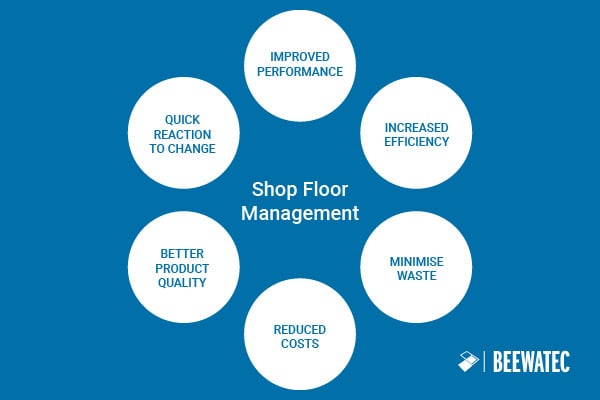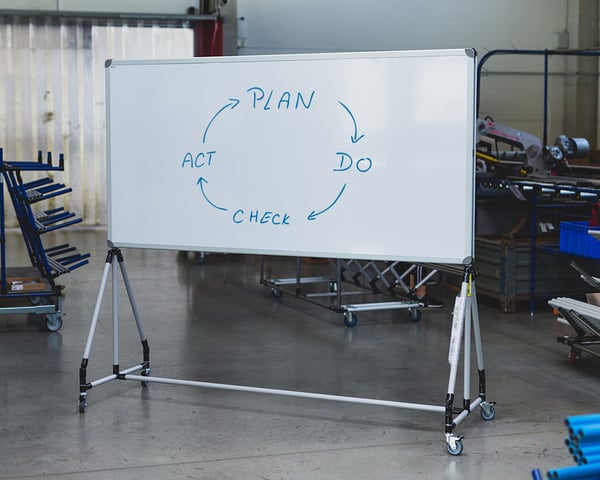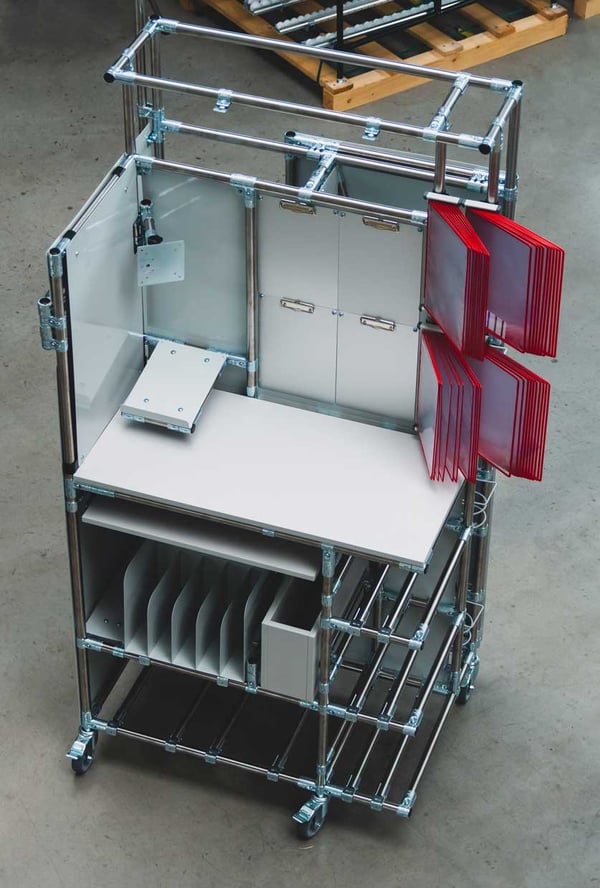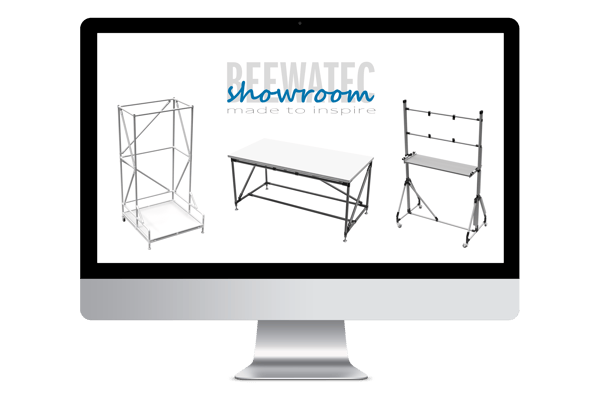Kaizen - Kaizen principle, Kaizen methods & importance for companies
In a world where markets are changing rapidly and competition is more intense than ever, organizations are looking for effective methods to remain...
Modular pipe systems
Attachments
In the competitive environment of today's marketplace, effective production management is crucial to the success of any business. Shop floor management is becoming an increasingly important tool in Lean manufacturing to achieve higher productivity, increased quality and reduced costs. This article aims to explore in more detail the nature of shop floor management, its key elements and the benefits it can bring to modern manufacturing businesses.
Shop floor management means managing the production directly where the work happens (shop floor). Its main objective is to improve the performance of production processes, maximise efficiency and minimise waste. This approach focuses on the active participation of workers on the shop floor and uses their knowledge and experience to identify problems and find solutions on the spot.
Shop floor management relies on standardization of work processes, visual management through whiteboards and charts, and regular communication and collaboration between management and employees. Key elements of this approach are a systematic approach to problems (for example, through the PDCA cycle - Plan-Do-Check-Act), continuous improvement and staff development through training and support.

The concept of shop floor management has its roots in Japanese quality management and the principle of Kaizen (continuous improvement process). It first appeared in companies such as Toyota in the 20th century, where it was a key element of success in the introduction of Lean management. Since then, shop floor management has become an important tool for manufacturing companies around the world.
Participative Approach: Shop floor management focuses on close collaboration between management and employees directly at the workplace. Employees are actively involved in identifying problems and finding solutions.
Standardisation and Visualisation: Processes are standardised and visualised through whiteboards, charts and control points, making it easy to identify deviations and waste.
Continuous Improvement: Shop floor management supports continuous improvement of production processes through the PDCA (Plan-Do-Check-Act) cycle and the Kaizen principle. Employees are encouraged to find new ways to do their jobs more efficiently and effectively.
Training and Development: Employees are continuously trained and developed in their skills and knowledge, which enhances their ability to contribute to the success of shop floor management and the overall performance of the business.
A proper production management is crucial to the success of any manufacturing company for several reasons:
Optimizing production processes: Effective management of the production environment enables companies to identify and eliminate unnecessary waste, minimize losses and streamline processes, leading to higher productivity and competitiveness.
Improving product quality: Proper management of the production environment allows you to monitor and control production processes to ensure product consistency and quality. This reduces the risk of manufacturing defects and increases customer satisfaction.
Resource optimisation: Effective management of the production environment helps to optimise the use of labour, machinery and materials. This allows to reduce costs and maximize revenues.
Quick to react to a change: A well-managed production environment is able to react flexibly to changes in production or the market. This includes the ability to quickly adapt production processes to new requirements or obstacles.
Overall, it can be said that proper management of the production environment is the key to achieving competitive advantage and long-term sustainability of a manufacturing company in today's dynamic market.
PDCA implementation: PDCA (Plan-Do-Check-Act) system is a cyclical management model that is used to systematically improve processes within the shop floor.
Plan: Identifying problems, setting goals and planning steps to solve them.
Do: Implementing the plan and making changes.
Check: Monitoring results and comparing them with the planned goals. Identify deviations and problems.
Act: Implementing corrective actions and adjusting the plan based on lessons learned.
The PDCA cycle supports continuous improvement and innovation on the shop floor.

Successful implementation of SFM is key to maximizing performance and efficiency in a manufacturing environment. Here we will focus on the key recommendations for successful implementation of shop floor management in your business.
1. Management involvement and support of the whole team
Management should actively support and lead initiatives related to the implementation of shop floor management. It is important that management clearly communicates its intentions, goals and expectations regarding shop floor management.
The involvement of the entire team is critical to the success of the implementation. Every employee should be informed about the goals and benefits of shop floor management and should be actively involved in the change process.
2. Ongoing evaluation and feedback:
Ongoing evaluation of results and processes is essential to identify opportunities for improvement. Regular review of results and comparison with defined objectives will enable quick responses to changes and inefficiencies.
Providing feedback to employees is key to employee engagement and motivation. Encouraging open communication and respecting employees' views and comments can lead to valuable ideas and innovations.
3. Flexibility and adaptability to change:
Flexibility is essential in an environment of constantly changing conditions. A company should be able to respond quickly to new market demands, changes in production processes or technology.
Adaptability to change requires openness and the ability to learn from new situations. The ability to adapt quickly and implement new processes and strategies is key to maintaining competitiveness and success in the long term.
Consistent application of these recommendations can lead to process optimization, increased efficiency and competitiveness, and long-term market success.
BeeWaTec offers a wide range of products and tools that support the implementation of shop floor management.
As a lean supplier, we can provide a wide range of equipment and tools to help you achieve your shop floor management goals. Our modular system offers flexibility and modularity that allows for easy modification and optimization of work processes.
Maintaining a lean culture in your company is the key to a successful shop floor management implementation. Our visualization elements such as whiteboards, document trays, binders, magnetic pockets and labels help you create an environment that promotes transparency, better communication and employee engagement.
In addition, we offer assistance with implementing Kanban systems that allow for visual workflow management and tracking of tasks and inventory. This simple but powerful method allows you to react quickly to changes and optimize the material and information flow within your manufacturing environment.

Shop floor management is an important management approach that can enhance the performance and competitiveness of manufacturing companies. Its implementation brings many benefits, including increased productivity, improved product quality and reduced costs. The key to successful implementation of shop floor management is the involvement of management and the entire team, ongoing evaluation of indicators and feedback, and the ability to respond flexibly to change.
If your company is not on board with shop floor management, it's time to act! Start by introducing yourself to the principles and methods of shop floor management and conducting an analysis of the current state of your production. Involve management and employees in the process and gradually implement the basic elements of shop floor management. Don't be afraid to experiment and learn from your own mistakes. With effort and determination, you can achieve significant improvements in your manufacturing company and strengthen your position in the marketplace. Now is the right time to get on the road to more efficient and competitive manufacturing!

With our modular system you can implement any solution you need. Discover your possibilities, existing solutions or build your own material flow system with BEEVisio in 3D.
In a world where markets are changing rapidly and competition is more intense than ever, organizations are looking for effective methods to remain...
At a time when companies are striving to increase efficiency and cut costs, the concept of lean management has established itself as a highly...
The material flow is an important part of every production and logistics. It describes the physical movement of materials, products and goods through...